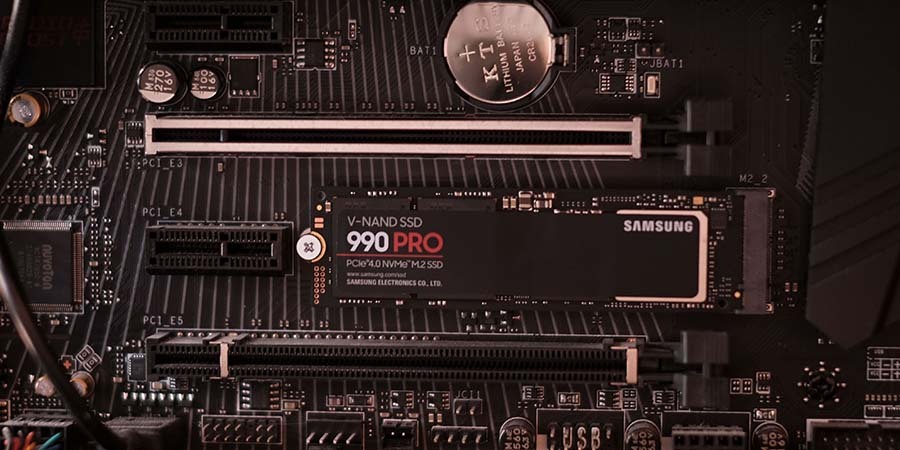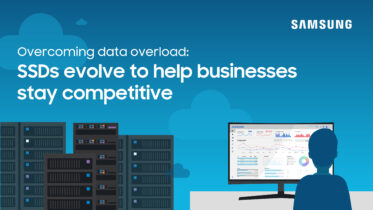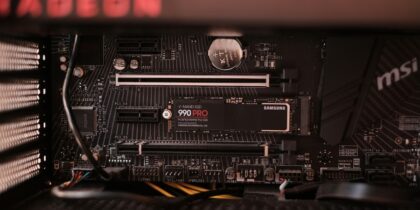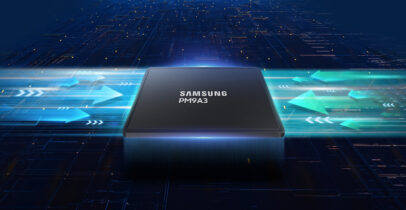With inflation on the rise, small and midsize businesses (SMBs) need to optimize their spending and operate more efficiently — and technology can help them do so. Take data storage, for example. Data is the lifeblood of every business, and accessing, implementing and securing that data remains a high priority.
Solid state drives (SSDs) offer the best data storage option for small business owners, thanks to a host of benefits that increase quickly after installation and can be enhanced further with smart and strategic applications to maximize use. Here are some tips for getting the most out of your small business SSD.
Upgrade older computers with SSDs to increase speed and storage
Replacing a hard drive or existing SSD with a better, faster SSD is the single most effective upgrade1 businesses can make to improve the performance of their aging computers. Not only do SSDs speed up boot times and applications, they also make it easier to access data and quickly save files.
In fact, basic SATA SSDs for desktop and laptop computers are at least two times faster2 than hard drives, while PCIe® SSDs reach read/write speeds that are six to 13 times faster. Higher performance means improved worker productivity, which can boost profits.
Select the right SSD for your business needs
SMBs have many SSD options to choose from for their specific performance, storage, device and budgetary needs.
If speed is the top concern, PCIe-based SSDs, built using the NVMe® transfer protocol, are the fastest SSDs on the market today. They are purpose-built for flash memory and directly connect to CPUs through the PCIe interface. Samsung 990 PRO NVMe SSD, for example, delivers sequential read/write speeds of 7450/6900 MB/s. Samsung 990 PRO also comes in an M.2 form factor and 1TB, 2TB and 4TB configurations.
However, budget-conscious businesses can still find many benefits in cheaper SATA SSDs. Although the SATA transport protocol was designed for HDDs, even the slowest SATA SSDs still double the speed of the fastest HDDs, providing an economical way to upgrade storage and prolong the life of aging computers. Samsung 870 EVO SATA SSD is a great example. It offers sequential read/write speeds of 560/530 MB/s and comes in a 2.5-inch form factor and capacities from 250GB to 4TB.
Keep some free space to maximize performance
Businesses generate huge amounts of data every day. Computer storage can fill up fast, from financial and customer data to images and videos for content creation. While it’s enticing to fill your drives to capacity, you should leave some free space on your SSDs to improve overall drive performance. That’s because of the way SSDs store data. SSDs write data onto the drive in blocks. SSDs write data faster when the blocks are empty. When SSDs begin to fill up with partially filled blocks, they have to overwrite data and this is a much slower process. As a result, businesses should leave free space on their SSDs to avoid performance problems.
To ensure the best performance, continually monitor storage usage, and when drives become 75% to 90% full, upgrade to higher capacity SSDs or delete unnecessary data to free up space.
Get your complete guide to SSD management
Discover how to effectively adopt and manage SSDs in your organization with this ultimate guide. Download Now
Take advantage of optimization tools
Optimization tools are available to help you make the most of your SSDs — and it’s important to take advantage of them. For example, Samsung released a new version of its Samsung Magician software, which enables small businesses to manage and monitor the health of their Samsung SSDs. Its abilities include a performance optimization tool that allows users to customize SSDs for full performance and power efficiency.
With Samsung Magician, businesses can install the latest firmware updates, which include security improvements and bug fixes. They can run diagnostic scans to discover potential issues and fix them, as well as migrate data from an old HDD or SSD to a new SSD. Samsung Magician, which previously was only available on Windows, now supports MacOS and the Android operating system. The latest version of Samsung Magician also features portable SSD software and a Samsung Memory Card/USB Flash Drive authentication tool.
Improve security and protect data
The safety of your SMB data is paramount, since compromised data can mean significant damage and cost to your business. That’s why it’s essential to ensure your SSD offers the ultimate security and protection.Samsung SSDshelp small businesses protect their data with AES 256-bit, hardware-based, full-disk encryption, which is a strong encryption algorithm available and is more secure than software-based encryption found in HDDs.
In addition, businesses can use Samsung Magician software to manage the encryption of their data stored in SSDs and use a built-in, secure-erase solution, which allows organizations to delete sensitive data in seconds. It also allows users to secure portable SSDs with a fingerprint and password setup.
Use external SSDs for data backup
As cyberattacks continually evolve and grow more sophisticated, small businesses must develop a business continuity and disaster recovery strategy, and that includes backing up their data. One easy way to back up data is to use external SSDs to make copies of data stored on employees’ computers.
Samsung T9 SSD compact is a drop-resistant portable drive that offers sequential read/write speeds of 2,000 MB/s. Available in 1TB, 2TB and 4TB capacities, T9 is about two times faster than the previous T7 model and can transfer a 4GB HD video in just two seconds.
Furthermore, SSDs have no moving parts, so they are more reliable, durable and energy efficient than HDDs, which helps reduce costs. In addition, SSDs are built with full-disk encryption, providing the best data security for small businesses today.
Samsung SSDs lead the way
In today’s economy, small businesses are seeking to reduce costs and run business operations in the most efficient and cost-effective way possible — and technology, including SSDs, helps them do just that.
By following these tips, small businesses can benefit from the latest generation of SSDs, manage and gain control of the proliferation of data, improve worker productivity and keep their data safe. Samsung SSDs provide efficient, high-performance storage solutions fit for any SMB budget.
Explore the full range of Samsung SSDs. And learn how to choose the right SSD for your business.
1 PCMag. “The Best SSDs for Upgrading Your Laptop.” Feb 12, 2024.
2 PCMag. “SSD vs. HDD: What’s the Difference?” Feb 12, 2024.








